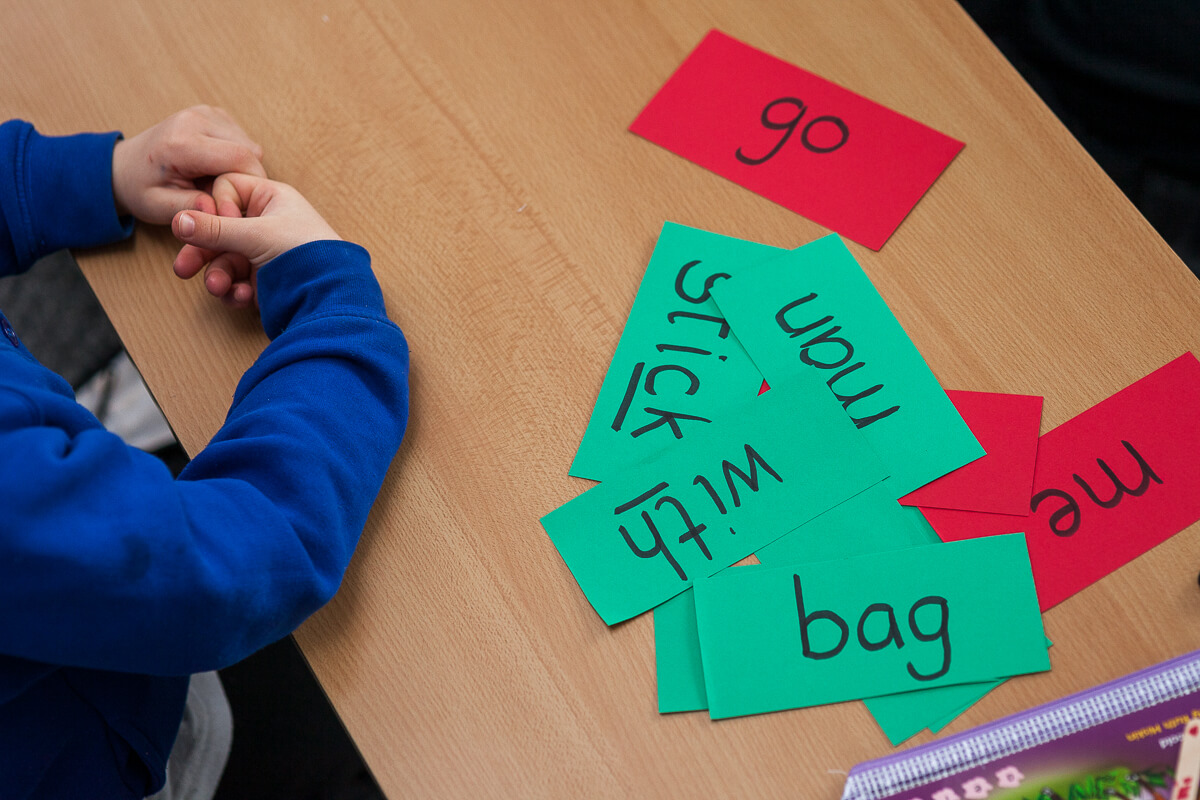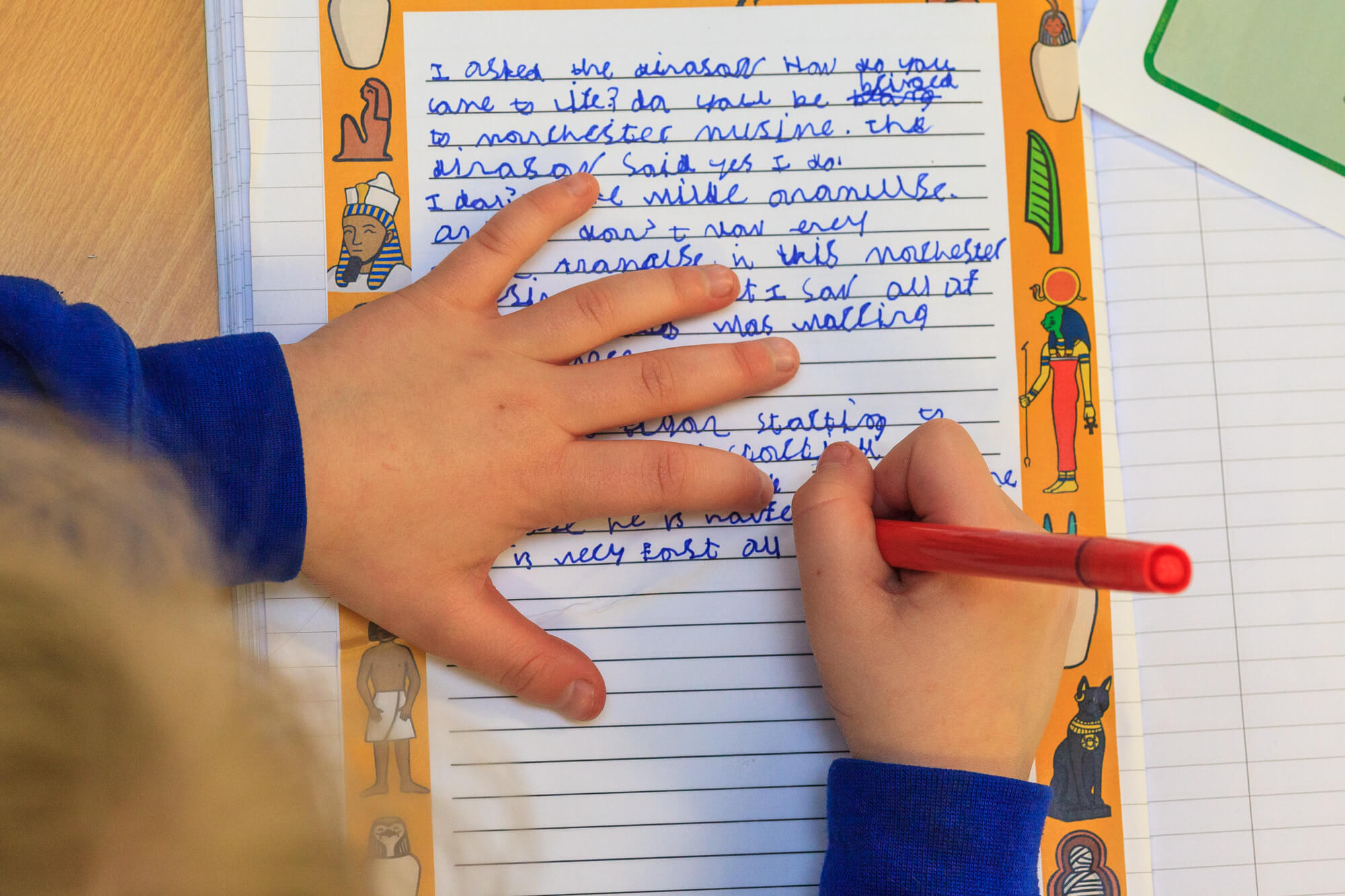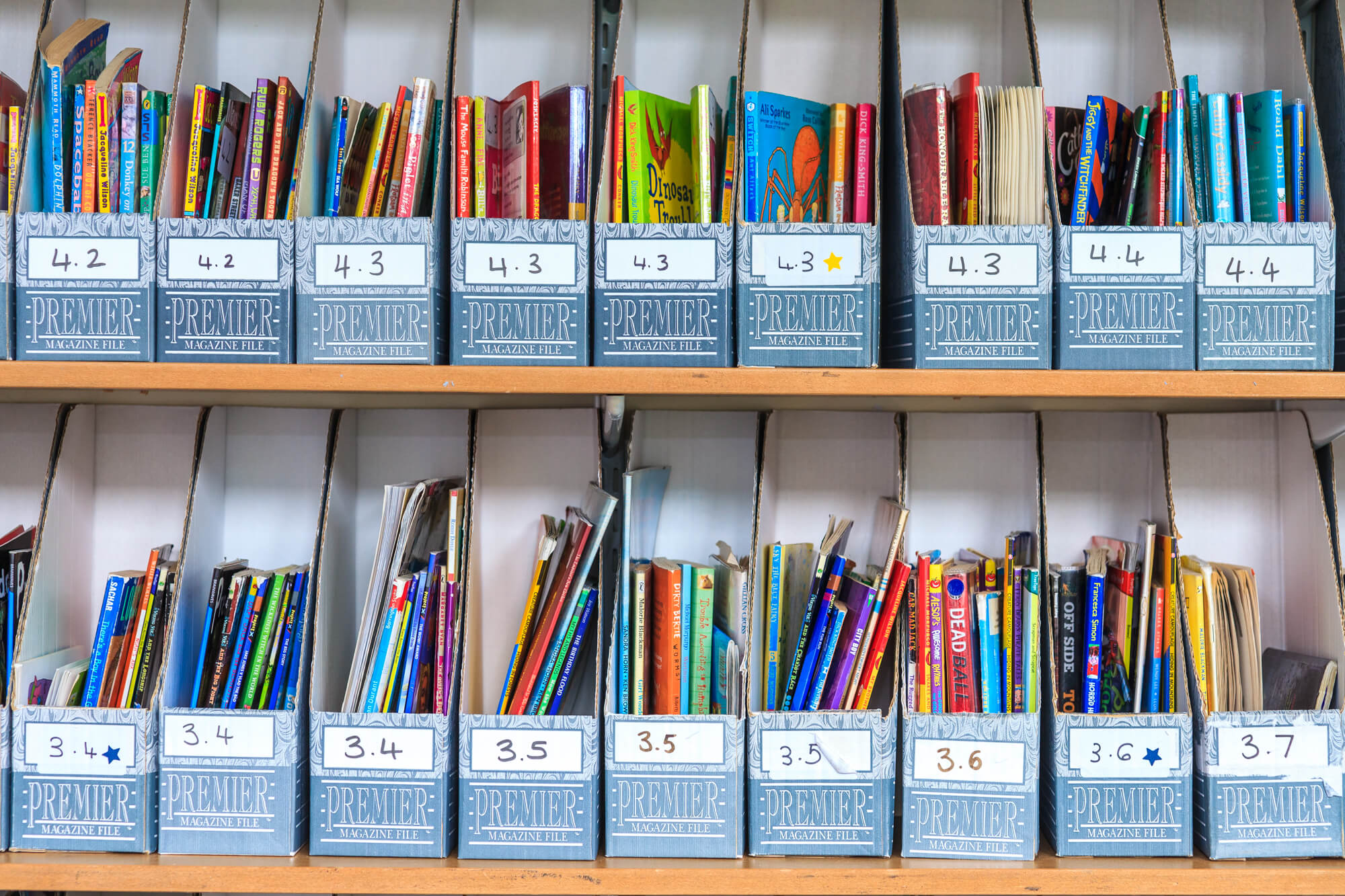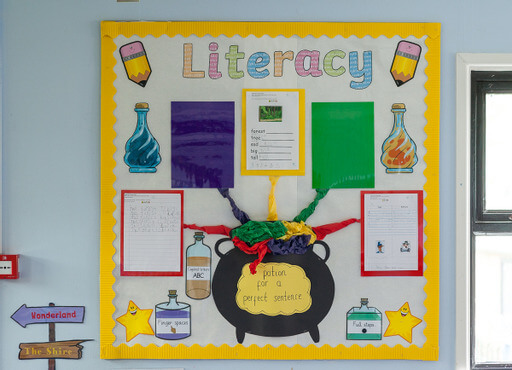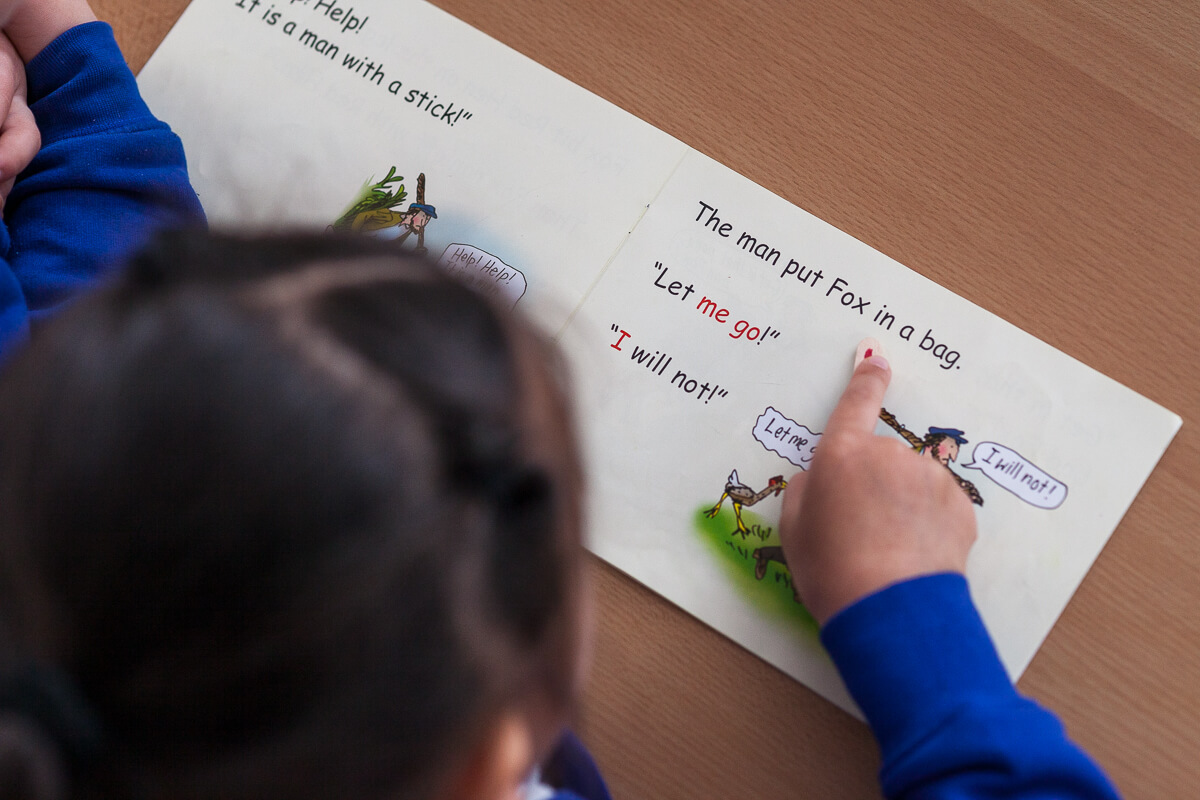Intent
At Moorhill Primary School we believe that a quality English curriculum should develop children’s love of reading, writing and spoken communication. We have a rigorous and well organised English curriculum that provides many purposeful opportunities for reading, writing and spoken communication. Our curriculum follows the aims of the National Curriculum for English 2014 to enable all children to:
- read easily, fluently and with good understanding,
- develop the habit of reading widely and often, for both pleasure and information,
- acquire a wide vocabulary, an understanding of grammar and knowledge of linguistic conventions for reading, writing and spoken language,
- appreciate our rich and varied literary heritage,
- write clearly, accurately and coherently, adapting their language and style in and for a range of contexts, purposes and audiences,
- are competent in the arts of speaking and listening.
These aims are embedded across our English lessons and the wider curriculum. We will provide the means for children to develop a secure knowledge-base in English, which follows a clear pathway of progression as they advance through the primary curriculum. Rigorous assessment and review will ensure that we are able to provide targeted support so that all children experience success in English; we believe that a secure basis in English is crucial to a high quality education and will give our children the tools they need to participate fully as a member of society.
Implementation
Early reading and writing is supported through the Read Write Inc scheme. Regular training and development days ensure that staff are equipped to teach with the expertise and skills required to promote excellent progress, as well as a love of reading. Children are matched to a reading book through RWI, phonically appropriate books and Accelerated Reader.
In KS2, or when children have completed the RWI programme, they further develop deeper reading skills in line with the progression map for the school. Each class, has, in its timetable, time for independent reading, guided reading and opportunities to listen to stories. The children also take part in organising and developing their classroom reading area. Involving parents is important so we communicate and raise the profile of reading through a half termly newsletter.
When planning literacy lessons, teachers make links to other areas of the curriculum to ensure that cross curricular links provide further context for learning. Teaching blocks focus on fiction, non-fiction or poetry, using high quality texts, in line with the 2014 National Curriculum and comprehension, grammar and writing are embedded in lessons. Lessons sequences themselves build progressively towards an extended piece of writing. Handwriting and spelling are taught outside the English lesson in short focussed sessions.
Assessment for Learning is embedded in literacy lessons and children are active in reviewing the successes in their work and identifying, with support from their teacher, target areas for development to ensure a continuous and individualised approach to improving their work.
Impact
Reading and writing are valued highly by the children and they can talk confidently about their reading and writing. Children are about to talk confidently about their preferences and through the careful choosing of texts build on their cultural capital. Children can write for a range of audiences and purposes using a developing and growing range of vocabulary.
Learners with Special Educational Needs
At Moorhill, we scaffold and adapt the learning to enable all learners to succeed.
Learning is adapted through:
- Explicit teaching and modelling
- Scaffolded resources
- The use of concrete manipulatives
- Pictorial examples and representations
- Use of technological resources to support learning
- Frequent revisiting of skills
- Adult support
Reading
Intent
At Moorhill, Reading is fundamental.
Reading is a life skill which is the cornerstone to enabling our children to become articulate communicators and we use the National Curriculum to do this effectively. We believe that all children should have the opportunity to be fluent, confident readers who are able to successfully comprehend and understand a wide range of texts.
We want pupils to develop a love of reading, a good knowledge of a range of authors and be able to understand more about the world in which they live through the knowledge they gain from texts. It is not only key for academic success across the whole curriculum but remains a crucial lifeline which prepares pupils for the next stage of their education. The aim for all of our children is to be able to read fluently and with confidence in many subjects. The foundations for successful reading at Moorhill are formed through our comprehensive phonics programme: Read Write Inc. We use Read Write Inc because it provides a succinct, repeated learning process which allows Moorhill children the opportunity to embed new skills before applying them in a comprehensive manner.
At Moorhill, we understand the importance parents and carers have in supporting their child to develop word reading, comprehension skills, fluency and a love of reading; we aim to encourage a home-school partnership which enables parents and carers to understand how to enhance the skills being taught in school through good quality texts.
Implementation
The Teaching of Phonics- RWI Phonics Programme
EYFS and KS1 children will be taught phonics through the Read Write Inc programme that explicitly teaches pupils a comprehensive set of letter-sound relationships through an organised sequence. This continues into Year 1 and 2.
The programme aims to build children's speaking and listening skills in their own right as well as to prepare children for learning to read by developing their phonic knowledge and skills. A detailed and systematic programme for teaching phonic skills is taught to children starting in Reception, with the aim of them becoming fluent readers by age seven.
In Reception and Year 1 the teaching of reading focuses on word reading, working out the pronunciation of unfamiliar printed words (decoding) and word recognition, learning to recognise by sight familiar printed words. Underpinning both is the understanding that letters represent the sounds in spoken words. This is why phonics is emphasised in the early teaching of reading when children are in EYFS and Year 1. The Read Write Inc phonics programme is used for this.
Both de-coding and comprehension skills are necessary for confident and competent reading, but neither is sufficient on its own.
It is also important to remember that progress in reading requires pupils to develop motivation and engagement, which help each child to develop persistence and enjoyment in their reading.
Children will need a wider range of language and literacy experiences across the curriculum to develop their understanding of written texts in all their forms. This should include active engagement with different media and genres of texts and a wide range of content topics.
In every classroom, RWI complex speed charts and an appropriate frieze are available to aid in children’s reading of unfamiliar texts. In Key Stage Two these are replaced by Set Two and Three sounds.
Reading Aloud for Pleasure
“If you are going to get anywhere in life you have to read a lot of books.” Roald Dahl
To foster a reading culture, teachers use Author Study books to model ‘good reading’ during reading aloud for pleasure. Every classroom should have 15 minutes of Reading For Pleasure daily. During this time, teachers should focus on what makes ‘good reading’ using gestures and drama to bring the print alive. Reading aloud fosters positive attitudes, enhances children’s motivation to read and develops vocabulary and other knowledge. It also contributes to their fluency as they listen to an accomplished reader bringing a text to life. The authors will be placed in every classroom for the half term for children to access when needed and shared through Book Club.
Teachers will have pre-read any books / texts shared with the children.
To prepare for reading a story, teachers should consider the following:
-
Anticipation
-
Pace
-
Voices
-
Pauses
-
Cliff-hangers
-
Word meanings
-
Asides
-
Illustrations
-
Memorable words and phrases
-
Joining in with poetry and stories.
Please see Appendix 2- Reading aloud for a more detailed explanation.
Reading TO children will also take place in all lessons.
Guided Reading
Guided Reading is the teaching of reading through ‘explicit instruction and conscious effort’. It will take place daily for 25 minutes and introduce a wide range of literature and non-fiction; explanations, modelling and support from the teacher for different aspects of reading, including fluency and allowing the children to think deeply and discuss a range of rich and challenging texts.
During these sessions, to ensure that the vocabulary gap does not widen further, children who are not able to read fluently will receive specific reading support in smaller groups. The whole school follows a similar plan so that it is sequenced effectively. Lessons will allow children to engage with a wide range of human experience: why characters make the choices that they make and why they feel what they feel. It will give them a chance to consider ideas beyond their experience.
The text for each reading lesson can be more challenging than the children might be able to understand independently because the teacher will be there for support. Even those children with less well-developed language or reading skills will be exposed to the challenging texts. Support for those children might be targeted questioning, further explanations, pre-teaching of vocabulary or the chance to re-read the text after the initial reading as a smaller group.
Teaching will also expose the idea of VIPERS (Vocabulary, Inference, Prediction, Explanation, Retrieval, Summarise and Sequence). Teachers will provide mental models for how each aspect of this works whilst activating their background knowledge and keeping inside the story. For example, asking children to talk to their partners and predicting what happens next based on what they have read, or visualise a character based on reading a description.
Socrative may be used for live assessment within Guided Reading lessons. This is accessed via Showbie.
Teachers will ensure that they use the model of I do, We do and You do, as part of the modelling process. Priority should be given to locating and retrieving information because from there inference, sequencing and explanation type questions can be accessed. We use texts provided by Vocabulary Ninja and other quality resources. Please see Appendix 4 for the Guided Reading Spine for Year 2-6.
In Key Stage Two we use an online reading program called Reading Plus. The children access this in school weekly and are also encouraged to use this at home on their allocated iPads.
Reading Plus Information for Parents
Impact
As a school, we always aim for children to leave Moorhill as competent readers who can recommend books to their peers; have a hunger for books and seeking out new authors, texts and genres which includes poetry and have a growing confidence in evaluating and discussing authorial language.
As a Year 6 reader, transitioning into secondary school, we aspire that children are fluent, confident and able readers, who can access a range of texts for pleasure, as well as use their reading skills to unlock learning and all areas of the curriculum.
Our outcomes will always aim to be at least in line with national averages for both age-related and greater depth expectations in both Key Stage 1 and Key Stage 2.
We want our pupils to acquire a range of self-help strategies so that they have the tools to continue to improve their reading skills in the future. We firmly believe that reading is the key to all learning and so the impact of our reading curriculum goes beyond the results of the statutory assessments.
Learners with Special Educational Needs
At Moorhill, we scaffold and adapt the learning to enable all learners to succeed.
Learning is adapted through:
- Explicit teaching and modelling
- Scaffolded resources
- The use of concrete manipulatives
- Pictorial examples and representations
- Use of technological resources to support learning
- Frequent revisiting of skills
- Adult support
Reading Policies
Writing
Intent
At Moorhill Primary School, we want our children to leave being able to communicate their ideas and needs through their writing, with a secure understanding and application of the skills and knowledge as outlined in the National Curriculum. We want them to be able to structure writing through the application of their grammatical understanding, acquire a varied vocabulary to fit a purpose and apply spelling rules. They will understand that writing is journey that goes through stages of planning, drafting, editing and publishing.
By the time they leave Moorhill, they will have developed a legible, cursive handwriting style.
Key Principles for Planning Writing
Our intentions in writing are for children to:
- Write for a purpose
- See themselves as real writers
- Take ownership of their writing
- See writing as an interesting and enjoyable process
- Acquire the ability to organise and plan their written work Implementation
Implementation
Our whole curriculum is shaped by our school vision, which aims to enable all children, regardless of background, ability, additional needs, to flourish to become the very best version of themselves they can possibly be. We teach the National Curriculum, supported by a progression of skills and knowledge; to ensure they are built on year-by-year and sequenced appropriately to maximise learning for all children. We use text based learning, allowing the children to experience a range of writing genres and authors.
Within lessons a structured approach is used, where teacher modelling is key, and an I do, we do, you do slow release model is used to support and develop writing. Children are supported through scaffolding, deployment of teaching assistants and access to additional support materials. Each classroom has a working wall, which is used to display modelled writing and punctuation and grammar support.
At Moorhill Primary School, spelling is taught in accordance with the National Curriculum and supported through RWI or The Spelling Book spelling scheme. It allows a mixture of teacher-led and investigative activities, which continuously revisit spelling patterns and rules within each year group.
Handwriting is cursive and taught through the Letter join scheme.
Writing Documents
Early years and Foundation stage
In EYFs, pupils begin to improve their fine and gross motor skills to start their writing journey. They will begin to form letters, and through shared writing, role-play and oral composition will begin to experiment with different forms of writing.
Years 1 – 6
Through Key Stage 1 and 2, we use high-quality texts, to engage and support the children’s use of vocabulary, grammar, and the writing process. Using the text, teachers build units of learning through small, sequential learning chunks. Every two weeks an independent piece of writing is produced which allows the children to apply their new skills around a different stimulus.
Assessment
Formative assessment takes place daily through live feedback, questioning and marking. It is recorded against the National Curriculum, using DCPro (our online assessment tool).
Summative assessment takes place three times a year, where pupils' independent writing is assessed against our writing grids.
Spelling
At Moorhill Primary School, spelling is taught regularly in focused sessions within each class using either RWI or The Spelling Book spelling scheme. Class teachers use The Spelling Book Spelling to support with the teaching of the different spelling rules and this can often be used as homework for children when applicable.
Impact
We aim for all children to make good progress from early years assessments and Key stage 1. We want them to develop a love of writing and a good knowledge of grammatical features, the writing process and be able to use a wide range of vocabulary. The children of Moorhill will be able to apply the spelling rules and patterns, they have been taught, effectively.

